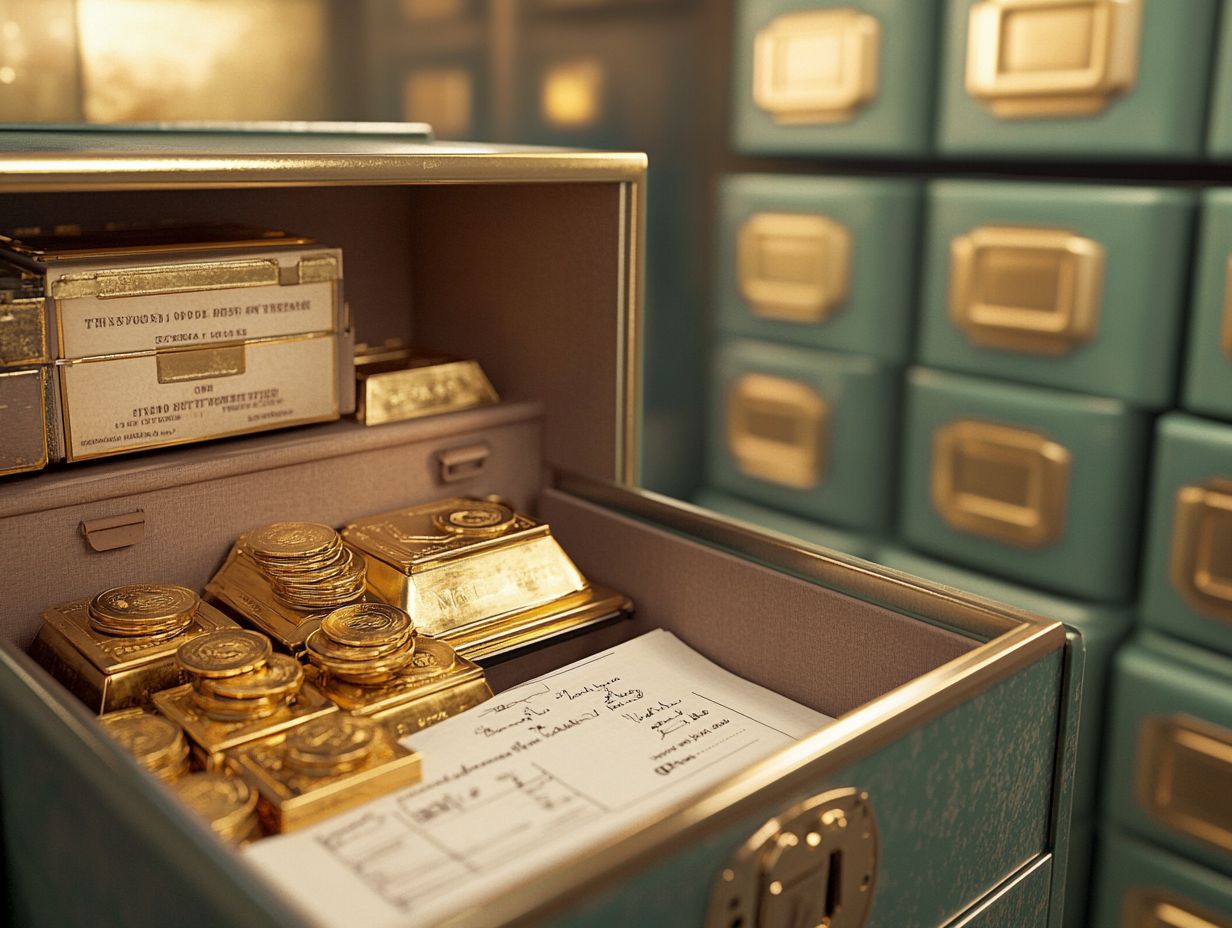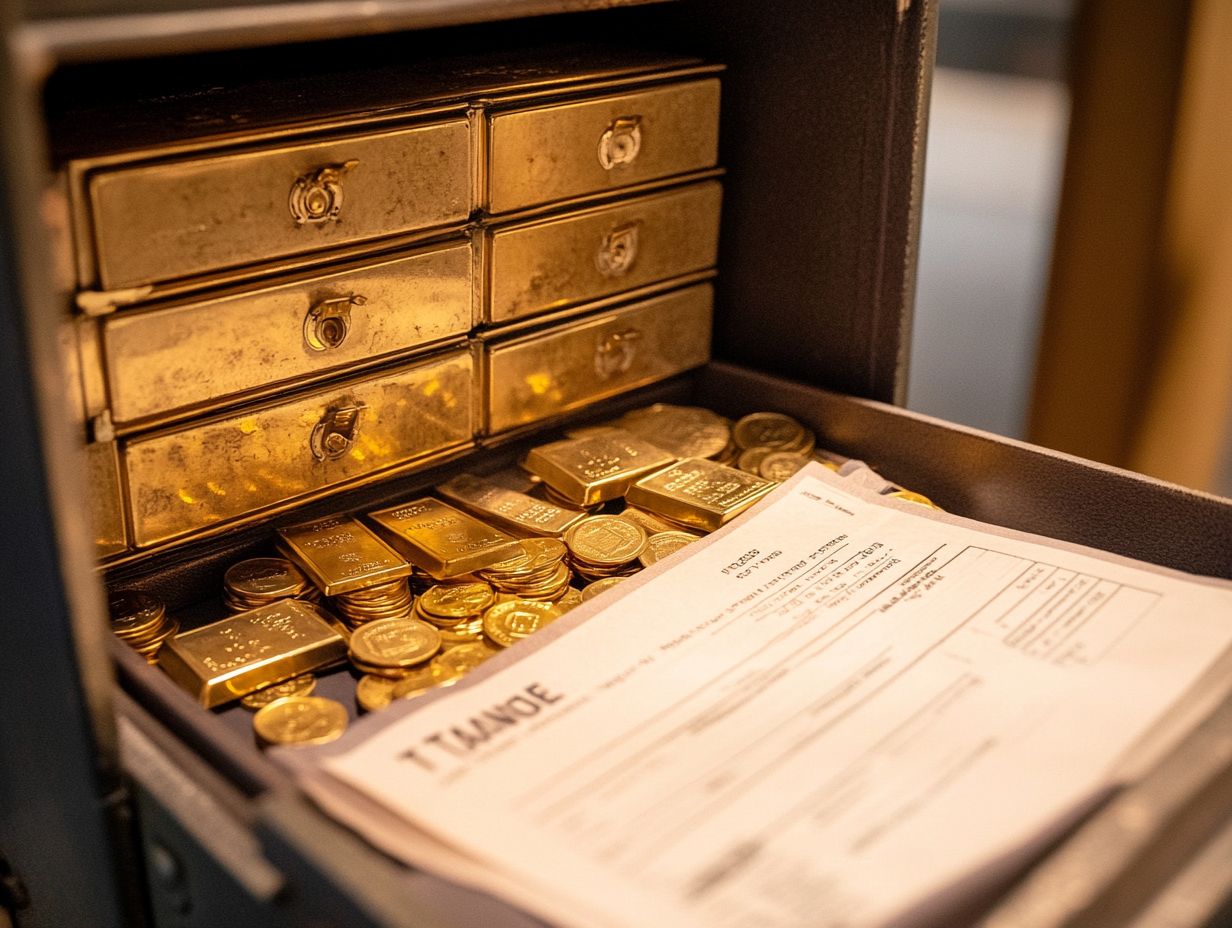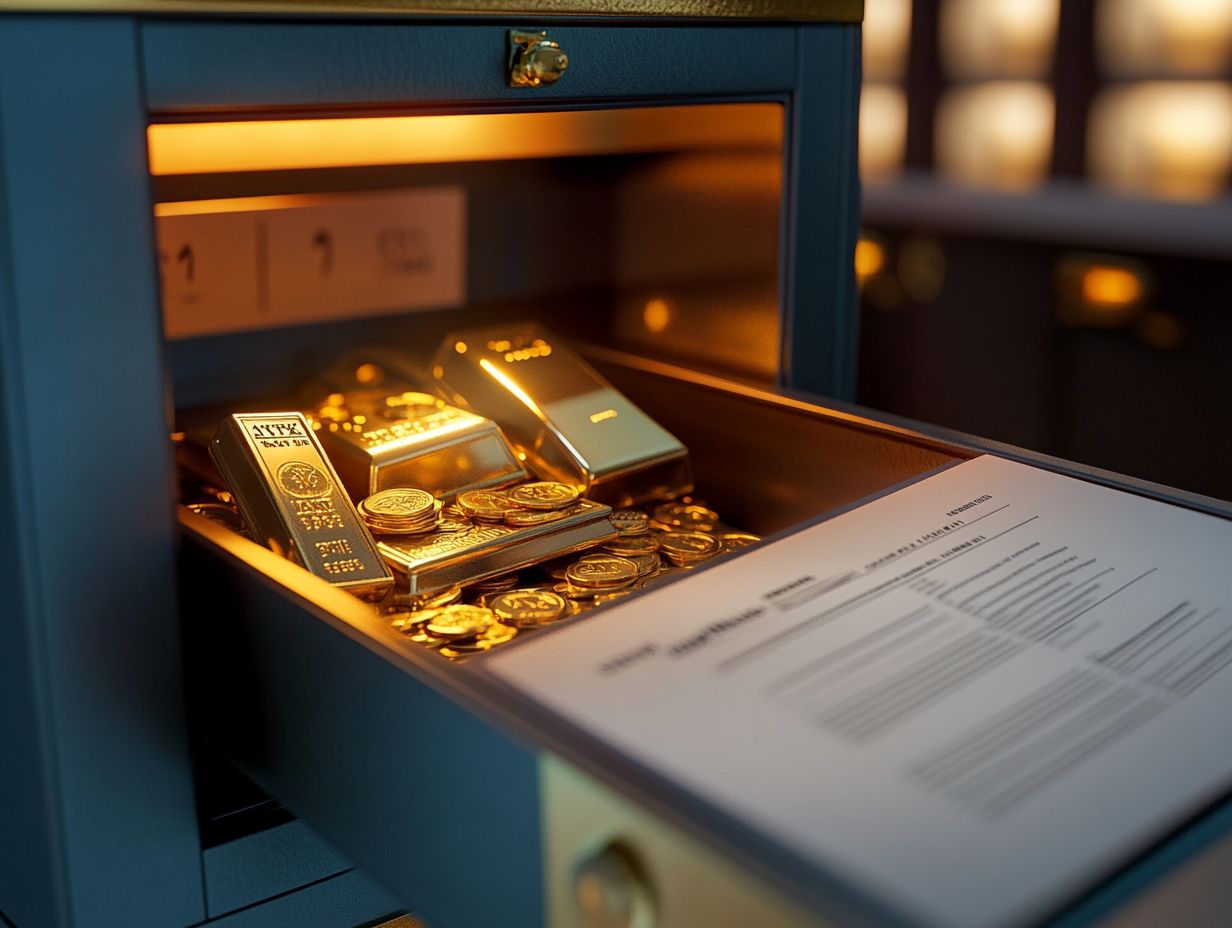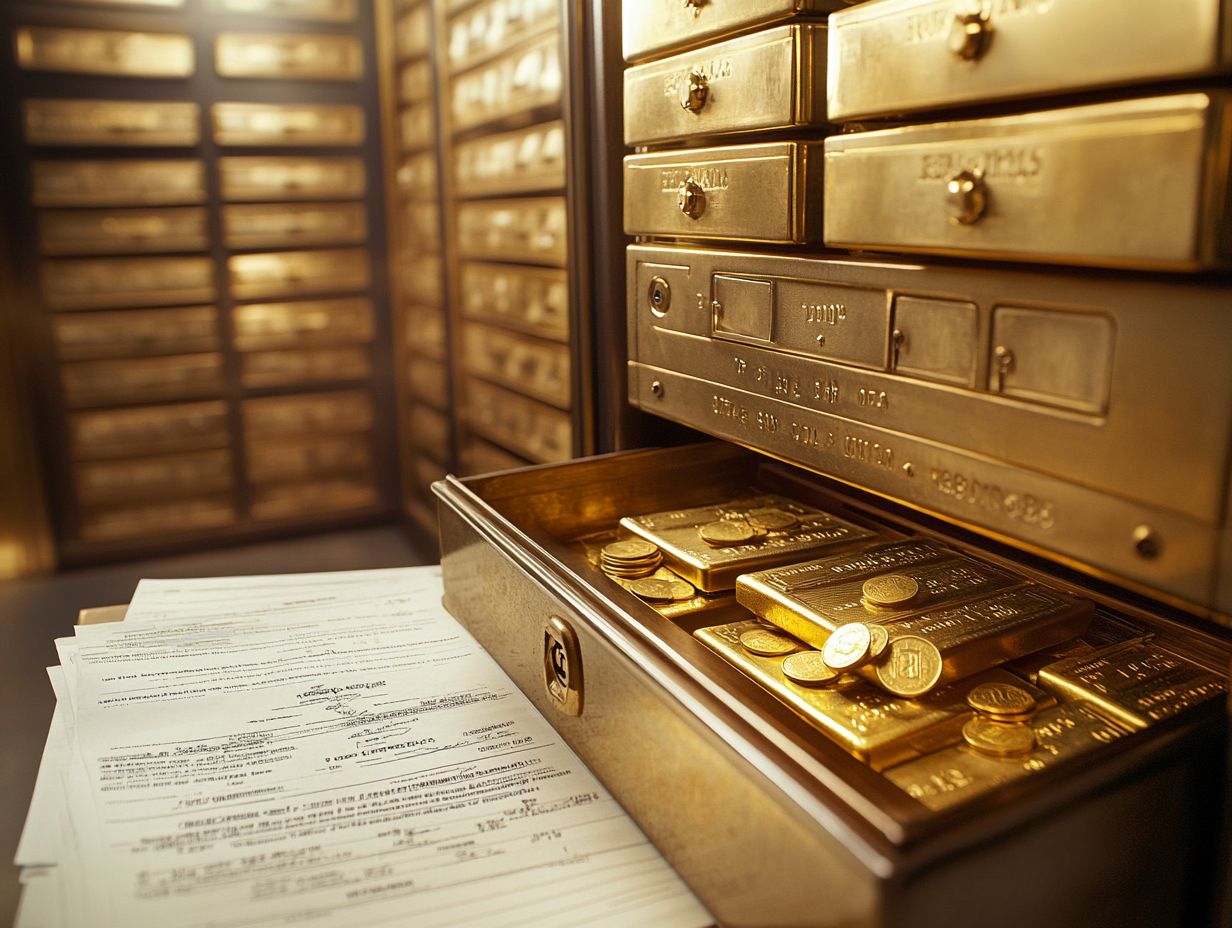The Tax Consequences of Storing Metals in a Safe Deposit Box
Storing valuable metals can be a smart investment strategy. However, the location of your storage is crucial.
Safe deposit boxes offer a secure option, but they come with tax implications that you should not overlook. This article covers what you need to know about utilizing safe deposit boxes for metal storage, including potential capital gains tax and necessary reporting requirements.
The article also explores alternative storage options and provides tips to help you minimize tax consequences. Read on to ensure your investment remains both secure and financially wise.
Contents
- Key Takeaways:
- Overview of Storing Metals in a Safe Deposit Box
- Tax Implications of Storing Metals
- Alternative Storage Options for Metals
- Tips for Minimizing Tax Consequences
- Frequently Asked Questions
- What are the tax consequences of storing metals in a safe deposit box?
- Do I need to report my metals stored in a safe deposit box on my tax return?
- Are there any tax deductions available for storing metals in a safe deposit box?
- What happens if I sell my metals stored in a safe deposit box?
- Do I need to pay any taxes on the metals stored in a safe deposit box when I inherit them?
- Are there any alternative options for storing metals that have different tax consequences?
Key Takeaways:

- Storing metals in a safe deposit box can provide a secure and convenient storage option, but it also comes with tax implications.
- Capital gains tax may apply when selling metals stored in a safe deposit box, and you must meet specific reporting requirements.
- Consider alternative storage options and use tax strategies to minimize the tax consequences of storing metals in a safe deposit box.
Overview of Storing Metals in a Safe Deposit Box
Storing metals like gold and gold bullion in a safe deposit box provides a secure method to safeguard your investment. You can also keep important documents and cherished keepsakes within easy reach.
Many individuals choose this storage solution due to the strong security features that banks offer. These include vaults designed to withstand natural disasters and deter theft. This gives you great peace of mind, knowing your valuables are safe!
Understanding Safe Deposit Boxes
A safe deposit box is your personal vault located within a bank or credit union, specifically designed to protect your valuables, essential documents, and cherished collectibles from theft and damage.
These boxes are made with strong steel construction, resisting both physical tampering and environmental threats like fire and water. They often come equipped with advanced locking mechanisms, requiring dual keys for access one key held by the bank and the other in your possession.
To secure a safe deposit box, you ll typically need to present valid photo identification, such as a driver s license or passport, along with a secondary form of ID. Once you ve rented a box, accessing it is simple: visit the bank during operating hours, show your identification, and retrieve your belongings in a private viewing area.
Rental fees can vary based on the size of the box and the bank s policies, but they re generally quite affordable, making this premium storage option accessible for many.
Why Store Metals in a Safe Deposit Box?
Storing metals in a safe deposit box is a smart strategy for anyone looking to secure their gold investments, collectibles, and financial records in a highly protected environment.
This approach enhances security against potential theft and natural disasters. It also gives you peace of mind, knowing that your significant assets are well safeguarded. With strong security features like surveillance systems and fireproof vaults, these storage solutions excel in risk management. Plus, having easy access to your stored metals makes financial planning straightforward, allowing you to make quick, informed decisions about your investments.
Insurance benefits are another crucial factor; many safe deposit boxes come with coverage that protects against unforeseen events, adding yet another layer of security to your financial portfolio.
Tax Implications of Storing Metals

Understanding the tax implications of storing metals, especially gold, is essential for your financial planning. It ensures you remain compliant with IRS regulations concerning capital gains tax and other relevant tax treatments.
Consider evaluating your storage needs or consulting a financial advisor to make the most informed decisions about your investments.
Capital Gains Tax
Be aware of capital gains tax when selling metals like gold. Metals are collectibles and have a unique tax treatment under IRS regulations.
Unlike stocks or bonds, which face rates of 15% to 20%, gold and other collectibles may be taxed at rates of up to 28%. This can significantly affect your investment strategies.
Using a Safe Deposit Box offers security. However, it may impact your accessibility compared to home storage or specialized vaults.
To minimize your tax liabilities, consider IRS-approved strategies. Options like 1031 exchanges allow you to swap investments without immediate tax penalties.
Reporting Requirements
If you re storing metals in a Safe Deposit Box, understand the IRS reporting requirements. These dictate how and when you must report gains from selling these assets.
Neglecting these rules can lead to hefty tax liabilities and penalties. The IRS requires precise reporting for any sale of precious metals gold, silver, or platinum.
Maintain careful records of purchase prices, sale amounts, and transaction dates. Good documentation ensures compliance with tax laws and provides a clear financial overview.
Tracking each transaction empowers you to calculate capital gains accurately. This will help you avoid unexpected tax burdens come filing season.
Alternative Storage Options for Metals
When exploring storage options for metals, assess the methods available. Consider private vaults, home safes, and specialized storage facilities.
Each option offers unique advantages and varying costs. Choose the solution that best meets your needs.
Comparing Different Storage Methods

Comparing storage methods reveals important factors like security, access limitations, and risk management solutions.
Each option banks, private vaults, or personal safes has its own advantages and drawbacks. For example, bank storage offers high security but may limit your access hours.
Private vaults provide enhanced security and flexibility, though they often come with higher insurance costs. Home storage offers immediate access but introduces significant security risks.
Understanding these factors helps you make informed choices that optimize your risk management.
Tips for Minimizing Tax Consequences
To minimize tax consequences from metal investments, engage in thoughtful planning. It’s vital to consult tax advisers for personalized guidance based on your financial situation.
Strategies for Reducing Tax Liability
Implementing effective strategies to reduce tax liability on metal investments can significantly enhance your after-tax returns, particularly when navigating the intricacies of IRS guidelines and regulations.
To achieve this, consider utilizing tax-advantaged accounts like Roth IRAs, which offer the benefit of tax-free growth and withdrawals. You might explore 1031 exchanges a way to delay paying taxes on profits from selling a property to defer taxes on profit from property sales.
Meticulous record-keeping is essential. Maintaining detailed documentation of purchase receipts, storage costs, and sale transactions will safeguard you against potential audits and ensure accurate reporting.
Take action now by setting up tax loss harvesting strategies. This approach balances gains with losses to minimize your overall tax liability. Such diligent financial planning not only maximizes your fiscal efficiency but also positions you to leverage opportunities as market conditions evolve.
Final Thoughts on Storing Metals in a Safe Deposit Box
Storing metals in a safe deposit box presents an effective avenue for asset protection and document safety. This method allows you to safeguard your investments while navigating the complexities of tax implications and potential risks.
This choice provides a secure environment free from theft or damage and grants you the peace of mind that comes from prioritizing financial security. Assess your financial strategies and preferences when selecting storage solutions.
By considering your unique circumstances such as varying levels of investment and existing financial commitments you can determine whether utilizing a safe deposit box seamlessly aligns with your overarching financial goals.
Ultimately, choosing to store metals securely in such a facility can play a significant role in your long-term wealth management and financial independence. Evaluate your options today for better financial security!
Frequently Asked Questions

What are the tax consequences of storing metals in a safe deposit box?
The tax consequences vary based on the type of metals and their purpose. Generally, personal-use metals stored in a safe deposit box are not taxed.
Do I need to report my metals stored in a safe deposit box on my tax return?
If the metals stored in your safe deposit box are for personal use, there is no need to report them on your tax return. However, if the metals are being held as an investment or for business purposes, you may need to report them and potentially pay taxes on any gains made from their sale.
Are there any tax deductions available for storing metals in a safe deposit box?
No, there are no tax deductions available specifically for storing metals in a safe deposit box. However, if the metals are being held as a business expense, you may be able to deduct the cost of renting the safe deposit box.
What happens if I sell my metals stored in a safe deposit box?
If you sell your metals stored in a safe deposit box, any gains made from the sale may be subject to capital gains tax. The tax rate will depend on how long you held the metals and your overall income for the year.
Do I need to pay any taxes on the metals stored in a safe deposit box when I inherit them?
If you inherit metals stored in a safe deposit box from a deceased person, you may need to pay inheritance tax on them depending on the state you live in. However, if you sell the metals, you may be subject to capital gains tax on any gains made from the sale.
Are there any alternative options for storing metals that have different tax consequences?
Yes, alternative options exist for storing metals that may have different tax consequences. For example, storing metals in a self-directed IRA may offer tax benefits, but there are certain rules and restrictions that must be followed. It is recommended to consult with a tax professional for personalized advice on the best option for your specific situation.














